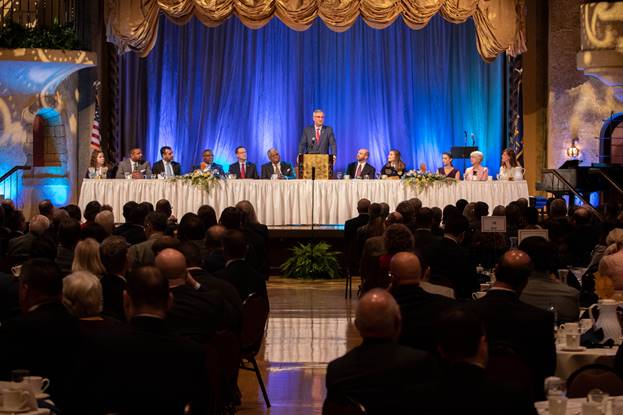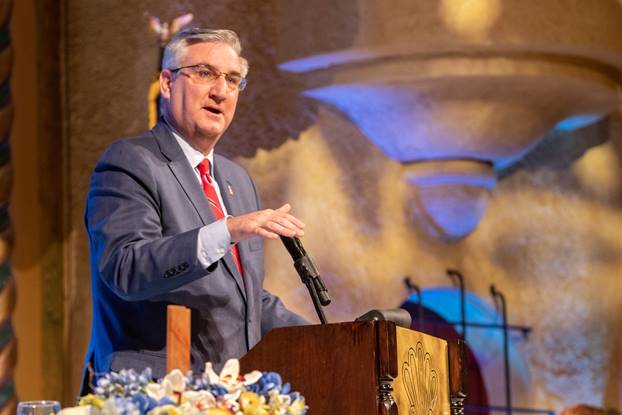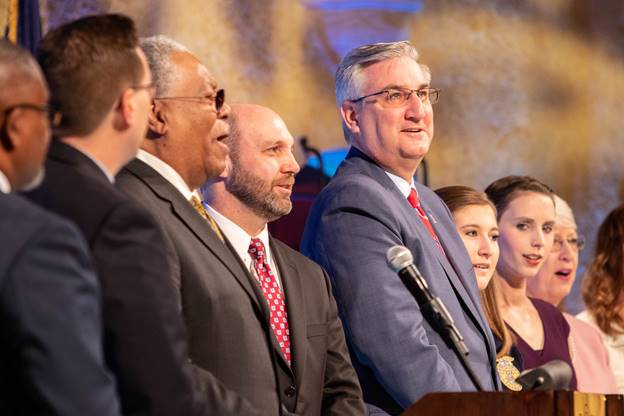
(INDIANAPOLIS) – Gov. Eric Holcomb spoke at the Indiana Leadership Prayer Breakfast this morning. The title of his speech is “The Beatitude Not Mentioned,” and the full text of his prepared remarks is attached.
The governor also introduced the event’s keynote speaker, Rachael Denhollander, an advocate for victims of sexual abuse and the first former U.S. gymnast to publically accuse Larry Nassar of sexual assault.
The Prayer Breakfast has been an annual tradition since 1969 and is modeled after the National Prayer Breakfast in Washington D.C. The non-denominational event is led by Statehouse Chaplain Matthew Barnes and a steering committee.

Gov. Holcomb speaks to the Leadership Prayer Breakfast attendees before introducing the keynote speaker, Rachael Denhollander.

The governor spoke about the Beatitudes and how being faithful to that list of instructions helps people live better lives.

Gov. Holcomb joins Everett Greene in singing “God Bless America” at the conclusion of the Leadership Prayer Breakfast.
Governor Eric J. Holcomb
Remarks as delivered
Indiana Leadership Prayer Breakfast
March 26, 2019
“The Beatitude Not Mentioned”
Thank you, Sami. We’re so proud.
Good morning, my friends. It’s good to be with all of you.
I want to thank the Prayer Breakfast Steering Committee for another packed house, and our Statehouse Chaplain Matt Barnes, for your commitment to the Lord and for your wisdom in times like these.
And especially Debby Magnuson for bringing us together again for this day of fellowship, reflection and unity, a welcome and needed respite for us all.
It’s wonderful as well to be surrounded by so many faith, so many state and community leaders from border to border and in between.
I’m reminded, as I am every day, that this is the day that the Lord has made, let us rejoice and be glad in it. I’m delighted and honored to be joining you all as we start our day in the right way.
Four years ago, I had one of the most amazing personal experiences of my life, one that exceeded all expectations and was truly transformational.
So much so that it had a major influence on my decision to not why, but if and how, I would run for public office, and influences my values and decision-making to this day.
You see, like many of you whom I’ve swapped stories with, I got to visit Israel as part of a tour with about a dozen or so other people, none I had met previously.
We saw the valley where David slew Goliath and the fortress of Masada, where nearly 1,000 Hebrews held out until they drew their last breath against the Romans. We walked the streets of Jerusalem and we prayed at the Western Wall.
But the highlight of this trip for me was when we drove to the Sea of Galilee, and stopped at the exact spot where Jesus delivered the Sermon on the Mount.
For those of you who have had the opportunity to visit this spot – yet — the landscape is dry, hilly and rugged, with the Galilee, a big blue oval set in a valley wedged between mountain ranges.
Before us was the ancient town of Capernaum, which dates back to 200 years before Christ, and beyond it, the sea.
Unlike the “Dead” Sea – which is so salty you can recline and read a newspaper — the Sea of Galilee is freshwater and appears to be peaceful, pure and inviting.
As some of you have done, I put my hand in it and cupped the cold water and I can still feel that thrill to this day.
Nearby are sulphur springs – just like we have in French Lick, Indiana – and to this day, people still flock to this spot for their healing powers.
I knew about this place from my reading and from my faith, but nothing — and I mean nothing — prepares you for being on the spot where Jesus preached his most famous sermon.
Probably the most known part is the Beatitudes, which includes insights that maintain their hold on us even today.
The people Jesus singled out for blessing were not the well-off or powerful. The people he singled out, on the contrary, included the poor in spirit, the meek, those who hungered and thirsted for righteousness, the peacemakers.
This was a radical departure from the teachings that came before, with an emphasis on helping those in need but also on showing them our love.
You could say that Jesus was bestowing the highest blessings on the most underdogs among us.
I can’t help but be struck by the fact that at a polarized time we’re living in now, it’s easy to be against things – to oppose, to run down, to ridicule, to label, to hate, even to fear.
It’s harder to love. Even though we’re taught that that’s the most important thing on our walk.
That that’s where true blessings lie, whatever your religion.
So, I for one shall never forget, nor ever be able to shake, that the Beatitudes serve still to this day as an instructional list to live by.
And, I believe being faithful to the spirit of this list calls on us to protect all Hoosiers regardless of who they are, where they come from, or the circumstances of their birth, all created in His image, all our neighbors.
This particular morning reminds me that there is yet another characteristic, that even though Jesus never mentions it, provides an important context for the Beatitudes.
It’s courage.
Jesus had the courage of His convictions – even if it ran counter to prevailing wisdom and law.
He had the courage to preach His gospel, even in the midst of the mightiest empire the world had ever seen, which, by the way, did not take too kindly to his words.
Such was the power, dare I say the glory of His message.
And His example, 2,000 years before cell phones or the Internet or cable TV, his message sped and spread across the mighty Roman Empire like the 5G of today.
Now, of course, this is not a solely “Christian” sermon.
When you visit Israel, you’re struck that despite being just one-quarter the size of Indiana – it is home to 3 of the world’s great religions.
The leaders of each showed tremendous courage.
Moses had the courage to stand up to the Pharaoh and led his people into an unknown and dangerous wilderness.
The Prophet Muhammed, called “the bravest one,” was known for his courage, but he had an interesting definition of courage.
It included self-control – and still does –accepting calamities and failures, and standing up for the truth.
I can think of no better description of our guest speaker this morning.
Her Wikipedia bio begins by informing us that she is an American lawyer and former gymnast.
That sterile description belies her immense courage and heroism and her ongoing activism on behalf of others.
Rachel Denhollander was just 15 when she was sexually abused by USA Gymnastics team doctor Larry Nassar.
Sixteen years later, she became the first woman to publicly accuse Nassar of sexual assault.
I cannot imagine the hurt or anger or confusion she experienced.
I can imagine that given the deeply personal nature of the assault, it might have been easier to remain silent.
And speaking out initially did have a price.
She lost her privacy, and she lost a few friends.
But she did what she believed, what she knew was right. And for the right reasons And, because of her courage and bravery, more than 250 women came forward as survivors of his abuse and countless more – many of whom we’ll never know around the world – were saved.
Today Rachel continues to educate and advocate, to heal survivors and she works to prevent this kind of abuse from ever happening in the first place.
Among her many many recognitions, Rachel was chosen by TIME magazine as a TIME 100 honoree, chosen by Glamour Magazine as a 2018 Glamour Woman of the Year, and she was in receipt of the 2018 Arthur Ashe Courage Award.
And here’s a shameless plug: she’s in the process of writing 2 books – two — her memoir, and a children’s book titled How Much is a Little Girl Worth?
Thanks to Rachel’s courage, people around the world are healing and they are learning the answer to that question.
Ladies and gentlemen, it’s my honor to introduce to you all this morning, Rachel Denhollander.



